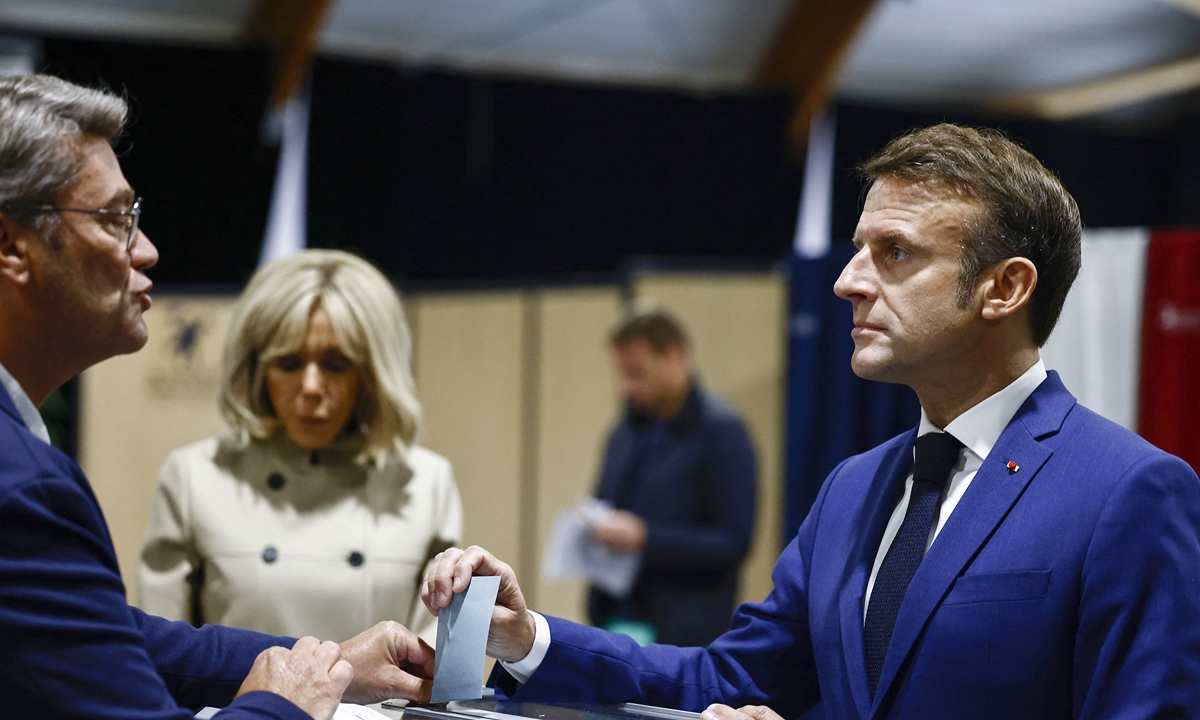
French President Emmanuel Macron casts his ballot in the first round of the early French parliamentary election, in Le Touquet-Paris-Plage, northern France on June 30, 2024. Photo: VCG
French President Emmanuel Macron and his centrist coalition have been defeated in the first round of France's snap legislative elections held on Sunday, as the far-right wing party National Rally (RN) took a clear lead, followed by left-wing alliance New Popular Front (NFP).
Experts pointed out that with voters showing extreme disappointment with the current situation, the rise of the far-right in elections has become almost irreversible. The emergence of a far-right leader signifies that the French political system will enter a volatile and unstable stage, as their actual governing results are worth observing.
According to the provisional results published Monday by the French Interior Ministry, without counting its allies' votes, the RN alone gained 9,377,109 votes or 29.25 percent of the ballots. Thirty-seven RN candidates won more than 50 percent of the vote and were elected as deputies, according to the Xinhua News Agency.
The RN, together with its allies, got 33.14 percent of the vote, French news channel BFMTV said. Following the RN, NFP won 8,974,463 votes, or 28.5 percent of the ballots, with 32 alliance members elected. Macron's coalition finished in third place, with 6,425,525 votes.
According to projections, the results should have given RN and its allies between 260 and 310 seats in the National Assembly. No political group has secured an absolute majority yet, as RN's Marine Le Pen called on voters to keep up the voting in the upcoming second round of the elections set for July 7.
While an absolute majority will allow the far-right wing party to occupy the position of prime minister in the next government, the current situation indicates that even without an absolute majority, RN is likely to have the most deputies in the National Assembly, observers noted.
On June 9, French President Emmanuel Macron announced the dissolution of the National Assembly and called new legislative elections after his Renaissance party coalition suffered a heavy defeat in the European Parliament (EP) elections. French media outlets describe the snap legislative elections in France as "a historic moment to face."
Macron hoped for a "clarification," but the first round of the legislative elections, with the RN enjoying a wide lead and "at the doors of power," constitutes a "disaster" for the head of state, said the press, which almost unanimously called for a "block" on the RN party put in the lead by the French. With a surprise dissolution announced right after the European elections, Macron "made a bet and lost it," said French media outlet Le Figaro.
A far-right party has never come out on top in a French general election, said Le Monde, quoting a French scholar, who warned that the RN does not adhere to certain constitutional principles that are "at the heart of the French Republic."
"The rise of the far-right in the elections is a clear indication that the political landscape in Europe has undergone a reversal," Zhao Junjie, a research fellow at the Chinese Academy of Social Sciences' Institute of European Studies, told the Global Times on Monday. "Traditional pro-establishment parties have been unable to find solutions to ease social tensions and meet the wishes of voters, leading to political polarization. This trend was already evident in the previous European Parliament elections."
From the current situation and public opinion, it appears that the far-right will likely gain a majority of seats in parliament, which seems to be irreversible in the second round, while Macron's centrist coalition is expected to suffer a major defeat, he noted.
This is not the first time that there has been a cohabitation in the French government, but in previous cases, it was generally a coalition between the center-left and center-right, without the presence of a far-right leader, Zhao told the Global Times. The emergence of a far-right leader signifies that the French political system will enter a volatile and unstable stage, and will likely remain there for a long time.
The high voter turnout in the elections has also attracted attention. A record turnout of 66.71 percent was observed during the first round of the elections among 49.5 million registered voters in less than half a day. More than 2.6 million eligible voters have also chosen to vote by proxies, four times the number in 2022.
The turnout reflects the strong dissatisfaction among voters with the traditional pro-establishment camp, Zhao noted. Due to this disappointment, such a high voter turnout typically propels non-traditional parties to the forefront. However, because the far-right has never been in power, some political promises they have made were not mature enough and are difficult to implement, analysts pointed out.
If the far-right does indeed gain a majority of parliamentary seats and the prime minister's position, whether their political decisions will be as far-right as claimed remains to be seen, Zhao said.
At the same time, he noted that while voters are disappointed with the traditional pro-establishment camp, a far-right government may also fail to meet their expectations, which could lead to a potential backlash in public opinion in the near future.




